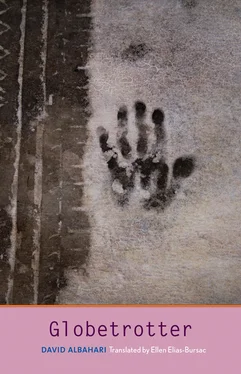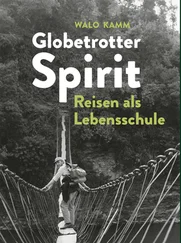He was wearing a plaid shirt, jeans, walking shoes, and a cloth hat. He refused the breakfast that Daniel Atijas offered him. He said he had had a coffee with a lot of milk on his way while driving, and that would hold him until noon, and then, he said, he’d have the sandwich he’d brought. In fact he’d brought two sandwiches, he said, but he was sure he’d only be able to eat one, and if that was the case, he said, he’d be glad to give one of us the other. As he was saying this he was looking at me as if everyone knew I was the one with the voracious appetite. If I’m not mistaken, Daniel Atijas only then looked up from reading his guidebook. Ivan Matulić’s grandson did not sit. He stood by the table, shifting from foot to foot, and every so often he raised his shoulders to keep his backpack from slipping any further. He did take off his hat and crumple it up in his hands. The waiter raised the coffee pitcher high in the air as if he were selling it at auction, and when the three of us shook our heads, he moved over to a table where artists from Mexico were sitting. Ivan Matulić’s grandson asked what trail we had chosen. He kept looking at me, though I was not the person who should be answering. I didn’t know anything either, though I did realize a little later that he must have known something, since he had come all ready for mountain climbing, which he could have known only if he had spoken earlier with Daniel Atijas. Never, I thought, is one act of betrayal enough; it is merely an introduction to a whole series of other betrayals, perfectly tucked one inside the next like those little Russian dolls that create a semblance of an endless series. Nothing told me what I should do, or rather whether I should do anything.
Perhaps it would have been easier for me if Ivan Matulić’s grandson had taken a seat, but he kept stubbornly standing, so I got a crick in my neck. The waiter went in the opposite direction, muttering something under his breath. He had thought for a long time, said Daniel Atijas, about where it would be best for us to go and had been torn between Johnston Canyon and one of the trails near Canmore, and he finally realized, he said, that in a day or two he’d be leaving here and he might never, hard as it was for him to say this, return to Banff, so this outing of ours into the mountains was a perfect chance for him to see once more, probably for the last time, some of the scenes that had made the greatest impression on him. Neither Ivan Matulić’s grandson nor I said anything. And besides, Daniel Atijas went on, he realized that so far he hadn’t, as is so often the case, seen what was nearest: Tunnel Mountain, on whose slopes the Centre stood, and so he’d decided, he said, that we would hike to its summit, where, the guidebook said, there was a beautiful view of the valley of the Bow River and the popular geological formations, the hoodoos, which, from the moment he first had seen them, had stayed with him. I was the first to nod, and then Ivan Matulić’s grandson said he agreed and that, faced with the same dilemma, he, too, would have chosen that trail. He had also read, said Daniel Atijas, that there was no tunnel through the mountain despite its name. When they were laying the plans in the late nineteenth century for a route to connect the eastern, Atlantic coast with the western, Pacific coast, said the guidebook, the first version of the plans included boring a tunnel through the mountain, but a better route was found, longer but much less expensive and less arduous to build.
The tunnel, it said, was never broached, yet the mountain kept its name, so in a symbolic sense there was some sort of passage there, though no one could traverse it. I interjected that this was the best possible outcome because Tunnel Mountain was sacred to the local Indians, who called it Mountain of the Sleeping Buffalo, and we could only imagine, I said, how much desecration would have resulted from boring such a tunnel. It would be tantamount, I said, to boring a hole through Buddha’s belly. The world is a crazy place, said Daniel Atijas, but luckily for all of us, it is not that crazy. I disagreed. I didn’t believe this to be a case of the triumph of reason; it was mere coincidence, and if no one had come up with an alternate route or had discovered such a route too late, we would now have a hollow mountain, and the whole region would look completely different. But how would I react, asked Daniel Atijas, to the claim that coincidence is the only true trajectory of fate, that fate is not determined by repetition and inevitability but by sudden departures from the predictable, by the addition of things that are new? Ivan Matulić’s grandson was still standing there; he had even begun scraping his shoes on the floor, making no bones about his impatience. I said I wouldn’t be able to answer that question, especially not right now, so early in the morning, and just when I smiled at Ivan Matulić’s grandson, we were getting ready to go. Daniel Atijas replied that he could not believe I was dismissing so lightly something that, he was profoundly convinced, lay at the heart of artistic creation, of inspiration itself.
Artistic creation, he said, is routine, like any job, and that was something, he believed, everyone would agree with. The writer writes, he said, just the way an official enters data into a form or certifies a form with the proper stamp; the musician transcribes parts of his symphony just the way a typesetter sets parts of a text; and the painter fills in the blank spaces on the canvas just the way a gardener pursues harmony in his flower beds. Creativity, he said, is everyday labor, nothing more — a job that may last for years, decades, and which produces, at intervals, books, paintings, sculptures, and concerts, among which there are those that are exceptionally successful, but they are all products of routine, subject to simple analysis. Only certain moments, he said, and only some of the artists, thanks to chance, leap out of the well-oiled system that manufactures, one might say, artworks like refrigerators or automobiles on an assembly line, and that is when works are created that elude all classification, he said, and become the basis for a new system. I couldn’t understand why he wanted to talk about this just then, why he wasn’t paying attention to the tormented expression of Ivan Matulić’s grandson, who clearly could find no point of contact between what Daniel Atijas was talking about and our climbing Tunnel Mountain. Our civilization, said Daniel Atijas, and each one of us as an individual, as artist or ordinary person, whatever, develops that way, he said, in leaps, from one coincidence to another, but no one can say when or whether the coincidence will happen. There are writers, he said, who write appealing, popular books their whole lives, though not a single one of the books steps outside the limits of what is already known, and they, these writers, have earned a prominent place in literature, but their impact is an impact with no genuine value: they have come into the world and left it, and nothing actually happened as a consequence.
Isn’t that how it is with all of us? I asked. Do we not all leave this world as if we had never been here, regardless of whether we lived on the plains or among mountains? Ivan Matulić’s grandson sighed loudly, the way every weary person does, and at that moment I clearly saw that my sympathies, if Daniel Atijas were to keep droning on about creative drives, might well shift over to the grandson’s side, which, I admit, surprised me so much that I felt a sort of shock, as when a source of very weak current zaps your fingers. I proposed that we leave the conversation about the meaning of creativity and the system of the world for the hike up Tunnel Mountain, or maybe for the descent, since one breathes with more difficulty while climbing, and an overabundance of words might disturb the already-jagged rhythm of breathing, while on the way down words flow like a torrent. I wasn’t sure whether Daniel Atijas would accept this; he didn’t strike me as the type who gives up easily — he looked like a person who might, on the surface, give up, but not really, on the inside — but it was too late for me to change anything. Daniel Atijas took out a map of Banff and its surroundings, pushed aside the cups and saucers, and spread it out on the table. We all leaned over the map. For a while we said nothing and looked it over while our heads almost touched. One of the three of us was breathing more hastily and jerkily than the others, but I wasn’t sure who.
Читать дальше







![David Jagusson - Fesselspiele mit Meister David [Hardcore BDSM]](/books/486693/david-jagusson-fesselspiele-mit-meister-david-har-thumb.webp)




